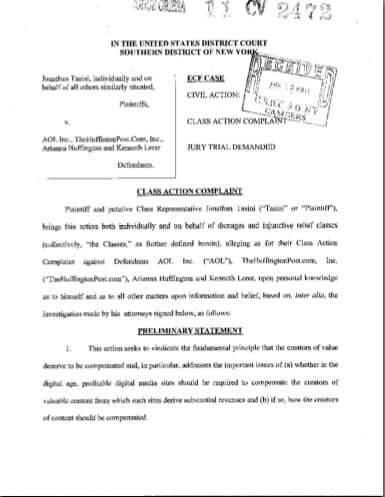
The Huffington Post (which variously also goes by HuffPost, Huff Post, HuffPo, or Huff Po), is being sued in a class action law suit by its own bloggers. The lawsuit, which names Ariana Huffington and Kenneth Lerer, the two co-founders of the Huffington Post, as defendants, alleges deceptive business practices and unjust enrichment. AOL, which recently acquired the Huffington Post for $315 million (which is what triggered the lawsuit) is also a named defendant.
The lead plaintiff, Jonathan Tasini, is a long-time writer and was, in fact, president of the National Writers Union for more than a dozen years. In 2001, Tasini prevailed in a case against the New York Times that went all the way to the Supreme Court, and which established the rule that the work of a freelance writer whose work is published in a periodical can not be republished in an electronic database without the explicit permission of or compensation to the writer.
At issue specifically in the new case against the Huffington Post and parent company AOL is the fact that Ms. Huffington and Mr. Lerer, in running the Huffington Post, created an Internet news site that was written almost entirely for free by all of the HuffPo’s guest bloggers, and then when Huffington and Lerer sold the Huffington Post to AOL for $315million, all those bloggers who helped built the site – who created the content that gave the site value – to the tune of that $315 million – got nothing, and Huffington and Lerer pocketed all the cash that the bloggers had earned for them.
Says the lawsuit, “This action seeks to vindicate the fundamental principle that the creators of value deserve to be compensated and, in particular, addresses the important issues of (a) whether in the digital age, profitable digital medai sites should be required to compensate the creators of valuable content from which sites derive substantial revenues and (b) if so, how the creators of content should be compensated.”
Said Tasini, in a press release about the lawsuit, “Arianna Huffington is pursuing the Wal-Martization of creative content and a Third World class of creative people. Actually, that is unfair to Wal-Mart because at least Wal-Mart pays its workers something for the value those workers create. In Huffington’s business model, economic gain is only reserved for her. Everyone else, apparently, is expected to work for free regardless of the value they create. Greed and selfishness is the order of the day, and that is just wrong.”
The Internet Patrol is completely free, and reader-supported. Your tips via CashApp, Venmo, or Paypal are appreciated! Receipts will come from ISIPP.
Huffington defended the charges, stating that “there’s got to be a distinction between everybody who works for a media company and everybody who blogs for a media company.” In a blog post on the Huffington Post site, Ms. Huffington lambasted the suit, claiming that “The lawsuit filed Tuesday by Jonathan Tasini is so utterly without merit, and has been so thoroughly eviscerated in the media — including being ridiculed as the “dumbest lawsuit ever” — I am hesitant to take any time away from aggregating adorable kitten videos to respond.”
Frankly, we haven’t seen it being eviscerated by the media at all, and no news (or other) site that has any legal chops has called the lawsuit dumb at all. But spin is, after all, what Huffington sells best.
Huffington goes on to sum up by saying that “People blog on HuffPost for free for the same reason they go on cable TV shows every night for free: either because they are passionate about their ideas or because they have something to promote and want exposure to large and multiple audiences. Our bloggers are repeatedly invited on TV to discuss their posts and have received everything from paid speech opportunities and book deals to a TV show. As Glynnis MacNicol describes it on Business Insider: “What Arianna was providing was a place for writers to advertise their wares — a sort of classified for wannabe writers, except unlike the classifieds, she wasn’t charging.” ”
According to the lawsuit, Tasini alone contributed 216 articles to the Huffington Post, and there are as many as 9000 other HuffPo contributors just like him, who have provided free content and, at Huffington’s urging, put out links to the content across the various social media platforms and even to their own mailing lists, thus driving traffic to the Huffington Post as well as creating the content.
Huffington, and HuffPost’s cronies, would like to make it seem as though this is a slam dunk lawsuit to defend, but there is a point at which a community news site crosses a line, and it is no longer about the community, it is about lining the pockets of those listed in the “WhoIs” information for the site. At that point, the site makes a decision to either do the right thing, and to acknowledge and reward those who put them over that line, or… to not to.
Regardless of how this lawsuit plays out (and we believe it’s no slam-dunk either way, and we do have the legal chops), one thing is clear: Ariana Huffington is giving GoDaddy’s Bob Parson’s a run for the “Scummiest CEO of the Year” award. Whether you have to, legally, compensate those upon whose contributions you built your $315million payout is completely different from whether, morally and ethically, you should have.
The Internet Patrol is completely free, and reader-supported. Your tips via CashApp, Venmo, or Paypal are appreciated! Receipts will come from ISIPP.










